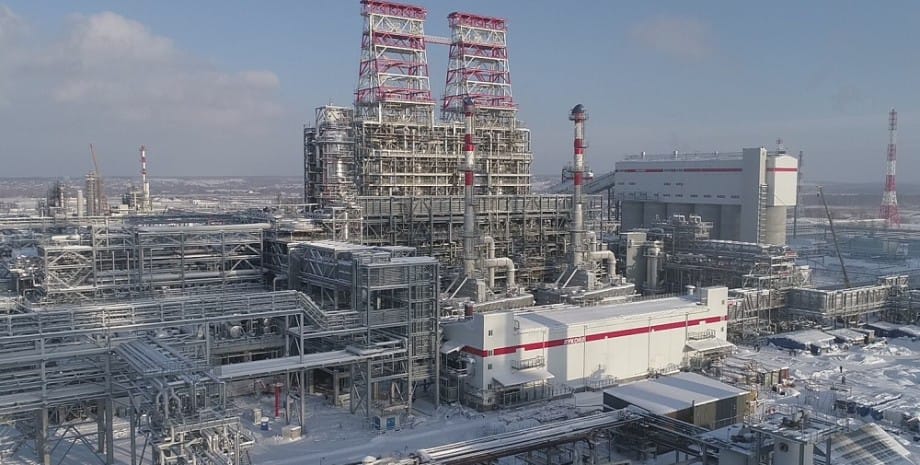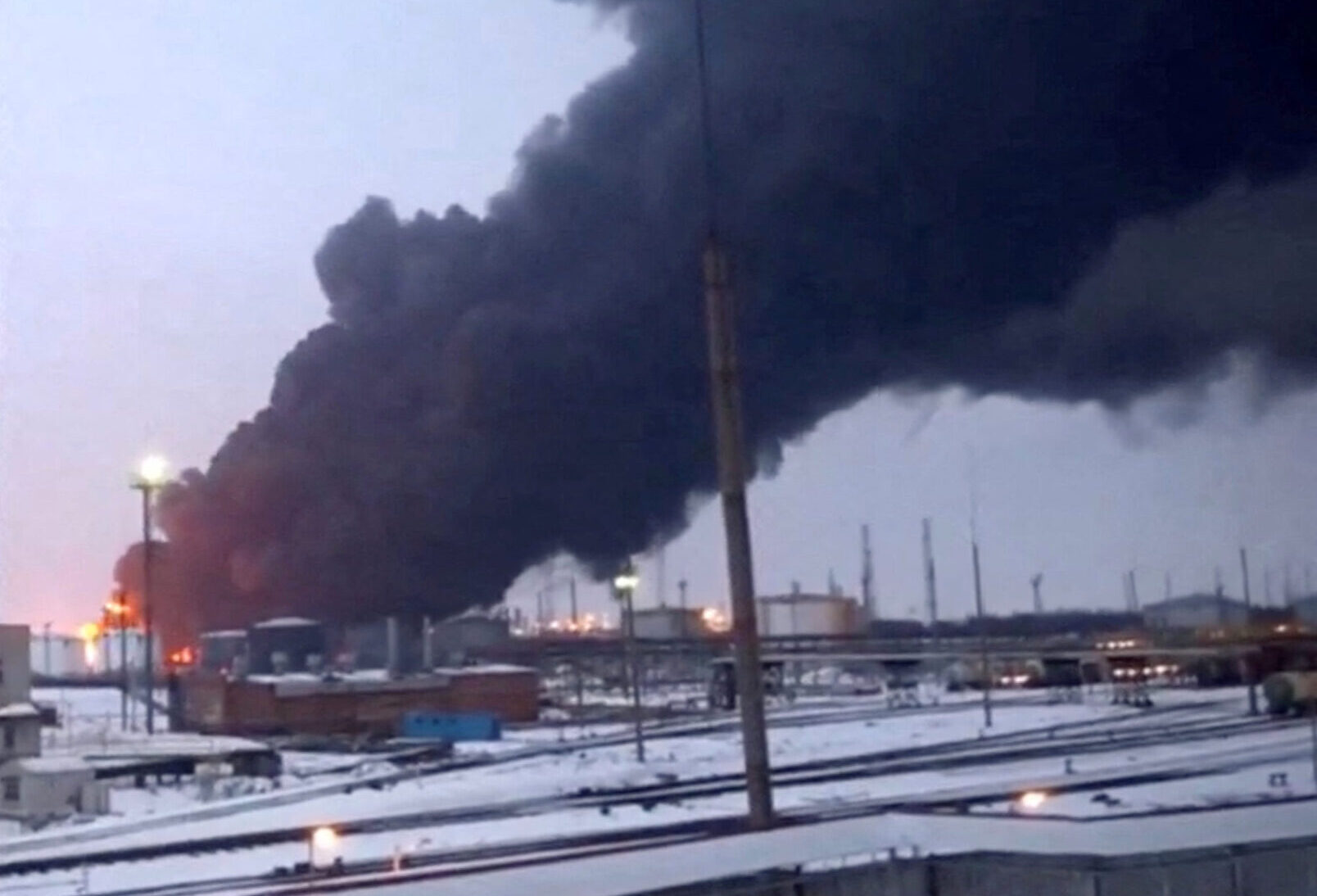4 APRIL 2024
Russian oil companies are experiencing difficulties repairing refineries due to Western sanctions, and attacks by Ukrainian drones may exacerbate their problems.
As reported by Reuters, when engineers at Russian oil company Lukoil discovered a turbine failure at its largest refinery on 4 January, they quickly realised that the problem was far from trivial, Reuters says.
Only one company knew how to repair the gasoline production unit at the Lukoil-Nizhegorodnefteorgsintez oil refinery (NORSI), located on the Volga River. The problem was that the company was an American one, according to five sources familiar with the incident.
The company, engaged in oil engineering and part of the multinational concern UOP, left Russia after its invasion of Ukraine.
"They (the engineers) rushed around to find spare parts and they couldn't find anything. Then the whole unit just stopped," a source close to Lukoil said.
Four other sources said the catalytic cracker, which is used to convert heavy hydrocarbons into gasoline, has not been operational since January, and it is unclear when it could be repaired due to a lack of experience in Russia.
The KK-1 unit is one of two catalytic crackers at the plant.
As a result, the NORSI oil refinery, Russia's fourth-largest oil refinery, has cut gasoline production by 40%, according to two sources. Lukoil did not respond to requests for comment.
The Lukoil oil refinery is an example of broader problems in Russia's energy sector, where some oil companies are trying to repair their plants, built with the help of American and European engineering companies, in the face of Western sanctions.
Difficulties have been exacerbated by attacks by Ukrainian drones that have hit at least a dozen Russian refineries this year, industry sources say. Reuters estimates that these attacks forced Russian oil refineries to close about 14% of their capacity in the first quarter.
"If the stream of drones continues at this rate and Russian air defences don't improve, Ukraine will be able to cut Russian refining runs quicker than Russian firms will be able to repair them," said Sergey Vakulenko, a Russian energy expert and non-resident fellow at the Carnegie Endowment for International Peace, a think tank on international relations.
Earlier, the State Department declined to comment on whether the United States called on Ukraine not to attack Russian oil refineries but noted that Washington does not support attacks on objects on the territory of the Russian Federation.
Before that, the Financial Times, citing sources, reported that the United
States allegedly called on Kyiv not to attack Russian refineries and other energy infrastructure, as they fear that this could lead to an even greater escalation and lead to a global increase in energy prices.
Commenting on this publication, Olha Stefanishyna, Deputy Prime Minister for European and Euro-Atlantic integration of Ukraine, said that the approach associated with attacks on Russian refineries would be considered correct by NATO standards.

 www.eurointegration.com.ua
www.eurointegration.com.ua
Russian oil companies are experiencing difficulties repairing refineries due to Western sanctions, and attacks by Ukrainian drones may exacerbate their problems.
As reported by Reuters, when engineers at Russian oil company Lukoil discovered a turbine failure at its largest refinery on 4 January, they quickly realised that the problem was far from trivial, Reuters says.
Only one company knew how to repair the gasoline production unit at the Lukoil-Nizhegorodnefteorgsintez oil refinery (NORSI), located on the Volga River. The problem was that the company was an American one, according to five sources familiar with the incident.
The company, engaged in oil engineering and part of the multinational concern UOP, left Russia after its invasion of Ukraine.
"They (the engineers) rushed around to find spare parts and they couldn't find anything. Then the whole unit just stopped," a source close to Lukoil said.
Four other sources said the catalytic cracker, which is used to convert heavy hydrocarbons into gasoline, has not been operational since January, and it is unclear when it could be repaired due to a lack of experience in Russia.
The KK-1 unit is one of two catalytic crackers at the plant.
As a result, the NORSI oil refinery, Russia's fourth-largest oil refinery, has cut gasoline production by 40%, according to two sources. Lukoil did not respond to requests for comment.
The Lukoil oil refinery is an example of broader problems in Russia's energy sector, where some oil companies are trying to repair their plants, built with the help of American and European engineering companies, in the face of Western sanctions.
Difficulties have been exacerbated by attacks by Ukrainian drones that have hit at least a dozen Russian refineries this year, industry sources say. Reuters estimates that these attacks forced Russian oil refineries to close about 14% of their capacity in the first quarter.
"If the stream of drones continues at this rate and Russian air defences don't improve, Ukraine will be able to cut Russian refining runs quicker than Russian firms will be able to repair them," said Sergey Vakulenko, a Russian energy expert and non-resident fellow at the Carnegie Endowment for International Peace, a think tank on international relations.
Earlier, the State Department declined to comment on whether the United States called on Ukraine not to attack Russian oil refineries but noted that Washington does not support attacks on objects on the territory of the Russian Federation.
Before that, the Financial Times, citing sources, reported that the United
States allegedly called on Kyiv not to attack Russian refineries and other energy infrastructure, as they fear that this could lead to an even greater escalation and lead to a global increase in energy prices.
Commenting on this publication, Olha Stefanishyna, Deputy Prime Minister for European and Euro-Atlantic integration of Ukraine, said that the approach associated with attacks on Russian refineries would be considered correct by NATO standards.

US sanctions hamper Russian oil refineries repair efforts – Reuters
Russian oil companies are experiencing difficulties repairing refineries due to Western sanctions, and attacks by Ukrainian drones may exacerbate their problems.








